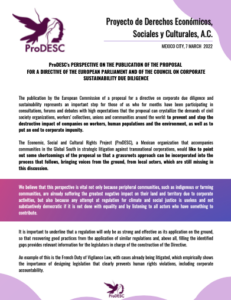07 Mar ProDESC’s PERSPECTIVE ON THE PUBLICATION OF THE PROPOSAL FOR A DIRECTIVE OF THE EUROPEAN PARLIAMENT AND OF THE COUNCIL ON CORPORATE SUSTAINABILITY DUE DILIGENCE
The publication by the European Commission of a proposal for a directive on corporate due diligence and sustainability represents an important step for those of us who for months have been participating in consultations, forums and debates with high expectations that the proposal can crystallise the demands of civil society organisations, workers’ collectives, unions and communities around the world: to prevent and stop the destructive impact of companies on workers, human populations and the environment, as well as to put an end to corporate impunity.
From the Economic, Social and Cultural Rights Project (ProDESC), a Mexican organisation that accompanies communities in the Global South in strategic litigation against transnational corporations, would like to point out some shortcomings of the proposal so that a grassroots approach can be incorporated into the process that follows, bringing voices from the ground, from local actors, which are still missing in this discussion.
We believe that this perspective is vital not only because peripheral communities, such as indigenous or peasant communities, are already suffering the greatest negative impact on their land and territory due to corporate activities, but also because any attempt at regulation for climate and social justice is useless and not substantively democratic if it is not done with equality and by listening to all actors who have something to contribute.
It is important to underline that a regulation will only be as strong and effective as its effective application, so that recovering good practices from the application of similar regulations and, above all, filling the identified gaps provides relevant information for the legislators in charge of the construction of the Directive. An example of this is the French Duty of Vigilance Law, with cases already being litigated, which empirically shows the importance of designing legislation that clearly prevents human rights violations, including corporate accountability.
As a result of our experiences testing the French law in the accompaniment of the Unión Hidalgo case in Mexico, we can find positive aspects and challenges for further discussion in EU bodies:
1. INCLUSION OF ADMINISTRATIVE SANCTIONS AND CIVIL LIABILITY
First of all, the transition from voluntary mechanisms, guidelines and “corporate social responsibility” approaches to mandatory regulations is a good sign. In that sense, it is encouraging to see the inclusion of administrative sanctions and civil liability, the possibility to file lawsuits led by the judiciary, which theoretically are more independent than mechanisms embedded in governmental ministry agencies, better enables affected persons to achieve justice and remedy.
However, we still believe that it is very important to include criminal liability, especially in cases involving serious human rights violations. Especially since the proposed directive still fails to address one of the central problems in these cases: the imbalance of power and resources between multinational companies and communities/defenders.
Most communities do not have the resources to access these judicial instances and, when they manage to do so, they face enormous challenges that can range from the translation of legal documents into their languages, the financing of lengthy trials or the attacks (often deadly) that they will face, just to mention a few.
2. PROTECTION FOR HUMAN RIGHTS DEFENDERS
In contexts such as Latin America, it is still common for human rights defenders to fall prey to intimidation, reprisals and attacks on their integrity or that of their communities for denouncing the impacts of companies. It is worrying to see that there is no reference in the proposed text to the importance of the work of human rights defenders as key stakeholders in human rights and environmental due diligence, nor to the documents that protect them, such as the UN Declaration on Human Rights Defenders.
In that sense, the European Commission has left a fine thread to pull on: we consider it positive that the proposed directive echoes other EU regulations such as the so-called Whistleblower Directive (DIRECTIVE OF THE EUROPEAN PARLIAMENT AND OF THE COUNCIL on the protection of persons who report breaches of Union law) to also cover persons who report breaches of this directive in the proposal.
The aforementioned whistleblower legislation requires the protection of persons who report breaches of Union law against retaliation such as intimidation, harassment, dismissal or demotion, among others. The interaction of the two regulations could mean that the EU recognises the risk that individuals will face when they make visible business-related human rights abuses, although it still needs to make clear that protection should include human rights defenders and not just workers or business partners, as the whistleblower directive does.
3. BURDEN OF PROBE
Furthermore, it is good to see that the proposal requires companies to develop whistleblower mechanisms that are accessible to civil society. However, like the French law, the directive places the burden of proof squarely on whistleblowers; which in practical terms means that it is the affected communities – most of them from the Global South, as reflected in the current French law cases – who must prove that abuses have occurred and that they are the responsibility of the company.
This position invisibilized the aforementioned imbalance of power between multinational corporations with access to unlimited resources and small communities that lack access to substantial information and documentation on corporate structures, permits required and assessments made.
4. ACCESS TO INFORMATION AND RIGHTS OF INDIGENOUS PEOPLES AND COMMUNITIES
Returning to the situation of access to information, while it is promising to see in the proposal that the responsibility for due diligence covers the entire value chain, it is important to keep in mind that for communities access to information about business partners, investors, parent companies or any other actors involved remains an opaque area. This also presents challenges for adequately protecting the rights of indigenous communities, who rarely give their free, prior and informed consent.
In that sense, the directive does refer to the UN Declaration on the Rights of Indigenous Peoples (UNDRIP), but does not explicitly require companies to respect and safeguard the right to self-determination of indigenous communities, including whether or not to give their consent to projects that impact their lives.
5. SPECIFIC GUIDELINES
Finally, it is encouraging to see that the European Commission is committed to developing guidelines for specific sectors or on specific adverse impacts, the creation of guidelines on assessment and risk of retaliation, on effective consultation with all stakeholders in a safe and real way, and the inclusion of an intercultural perspective that upholds indigenous rights standards should be among the priorities. These issues are in themselves relevant, although more detail is needed on the necessary secondary instruments that will give effect to what this law now generically announces.

